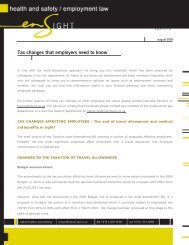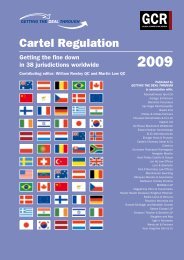The Private Equity Review - ENS
The Private Equity Review - ENS
The Private Equity Review - ENS
- No tags were found...
Create successful ePaper yourself
Turn your PDF publications into a flip-book with our unique Google optimized e-Paper software.
South AfricaMonetary Fund have estimated that sub-Saharan Africa will achieve some of the highestgrowth rates over the next five to 10 years.i Deal activityDuring 2011, private equity transactions in South Africa followed similar trends as inthe preceding few years, including investments in family-owned businesses, transactionscomprising large black economic empowerment (‘BEE’) components, and largecorporations and conglomerates unbundling their non-core assets.South African family-owned businesses account for approximately 65 per cent ofall business enterprises (slightly less than the global average of between 70 and 80 percent). <strong>Private</strong> equity groups have long seen family-owned businesses as one of the Africancontinent’s most popular sectors of economic activity, admired for being disciplined andwell run, and with generally lower levels of leverage and higher rates of return than mostother businesses. 3<strong>Private</strong> equity in South Africa is and will remain a significant role player in thedevelopment of BEE. According to J-P Fourie, the outgoing executive officer at SAVCA,the vast majority of transactions concluded by the private equity industry in South Africahave a significant BEE component and the majority of private equity fund managershave a BEE element to the structure of their funds. 4 BEE aims to statutorily redress theinequalities of South Africa’s past by giving previously disadvantaged groups economicopportunities previously unavailable to them.Secondary sales in the South African private equity market have also gainedmomentum in recent years.Five new control transactions were reportedly concluded in the South Africanprivate equity industry during the 2011 calendar year, 5 the most notable of which werethe Actis/Tracker deal and the Virgin Active/CVC Capital Partners deal (see Section III,infra).International investors seeking high-yield investments in emerging marketshave driven up the local South African listed market, making delisting a less attractiveoption for private equity funds, given the higher multiples being expected by sellers.Consequently there were fewer public to private transactions during 2011. One suchtransaction was the delisting of Universal Industries from the Johannesburg StockExchange (‘JSE’), by a consortium led by Ethos <strong>Private</strong> <strong>Equity</strong> (‘Ethos’).2011 saw approximately 12 new growth equity investments take place in the privateequity sector in South Africa, including Agri-Vie’s acquisitions of strategic equity stakes ineach of Hygrotech and HIK Abalone Farm (see Section III, infra).3 Michael Dynes, ‘Keeping it in the family’, 1 November 2010, www.africa-investor.com.4 J-P Fourie, ‘BEE and private equity powering on together’, August 2009, www.accountancysa.org.za.5 As at the date of publication, publicly available information (from SAVCA) was limited to yearsprior to the 2011 calendar year. In addition, the general trend in South Africa is that only thelarger private equity deals are publicly announced and the values of transactions are often notdisclosed, making obtaining reliable and verifiable statistics very challenging.307





